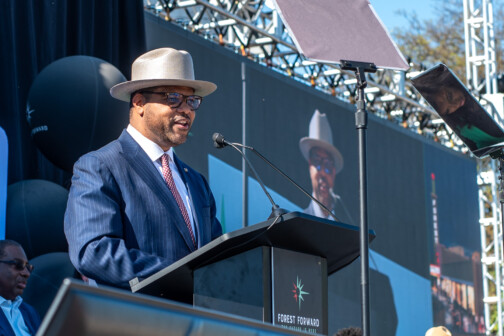In the morality play that is Parkland Hospital, we are supposed to regard president Ron Anderson as the good guy. He is—if you believe the Dallas Morning News—idealistic and noble. He puts his patients above all else, including such a tawdry matter as money.
You also know who the bad guys are. The county commissioners are stingy and hard-hearted. They don’t care about the poor.
In Act I, as reported in the News, our hero bemoaned recent cuts in federal and state subsidies, predicted a deficit next year of $27 million, and begged the commissioners to raise local taxes.
In Act II, the villains—the insensitive, uncaring county commissioners—fired back. They took control of Parkland’s line-item budget, replaced four board members (with four white businessmen, no less), and hired their own analysts to bird-dog the outlandishly expensive consultants retained by Parkland to set a long-term strategy. The News played the chorus, adding its own editorial breast-beating to make sure the audience got the message.
Act III was the play’s climax, but the News barely mentioned it. In fact, there was only a story subtitled “Board members urged to focus on people, not financial problems.” There, buried in paragraph 10 in the story’s jump, was a startling revelation: the new board is “undergoing a two-year effort to cut $70 million from the operating budget.”
I was dumfounded by that paragraph, so I checked up on it. Already the consultants and new board have found $38 million to cut this year, and there’s more on the way. It means there will be no deficit. It means there is no need for new taxes.
I was also dumfounded by how the News revealed this tidbit to its readers. It was slipped in as if it were the most natural thing in the world. Either the reporter did not understand its meaning or she didn’t want anyone else to.
The meaning is: we were duped.
I love Parkland Hospital. Years ago, my father served on its board. My own work with a local charity through the years has allowed me to see Parkland’s operations at the ground level. The care and concern at the hospital are first-rate. I would never want Parkland to suffer any diminishment in the quality or depth of its service. I would heartily support new taxes to prevent either.
But I also don’t like to see money thrown down the drain.
I’ll share one small example from what has so far been discovered. For years, the hospital’s purchasing department bought medical supplies in such bulk that much of it passed its expiration date before it could be used. By simply changing the bulk-ordering requirements, $10.5 million was instantly saved.
Did we truly need Ron Anderson’s tax increase to cover $10.5 million a year in wasted supplies, among other things? (Come to think of it, I haven’t read about this little discovery in the News.) Every institution, every business, and every family has to operate in a world of limited resources. To pretend otherwise is to live in a fantasy.
The breast-beating and theatrics have served to disguise, rather than illuminate, the financial quandary that Parkland faces. County Judge Margaret Keliher and the commissioners turn out to be not the play’s antagonists, but its true heroes. They have focused on the same question Stanley Marcus asked himself in building the nation’s best department store: how much quality can we deliver at an affordable price?
The question is reasonable, and the commissioners are right to ask it. Unfortunately, Anderson has lost the credibility to answer it. That means he has lost the ability to function effectively as the hospital’s president.
That’s Act IV. The sooner we get to it, the better off Parkland will be.
Get our weekly recap
Brings new meaning to the phrase Sunday Funday. No spam, ever.
Related Articles

Arts & Entertainment
‘The Trouble is You Think You Have Time’: Paul Levatino on Bastards of Soul
A Q&A with the music-industry veteran and first-time feature director about his new documentary and the loss of a friend.
By Zac Crain

Local News
Mayor Eric Johnson’s Revisionist History
In February, several of the mayor's colleagues cited the fractured relationship between City Manager T.C. Broadnax and Johnson as a reason for the city's chief executive to resign. The mayor is now peddling a different narrative.

Media
Will Evans Is Now Legit
The founder of Deep Vellum gets his flowers in the New York Times. But can I quibble?
By Tim Rogers


